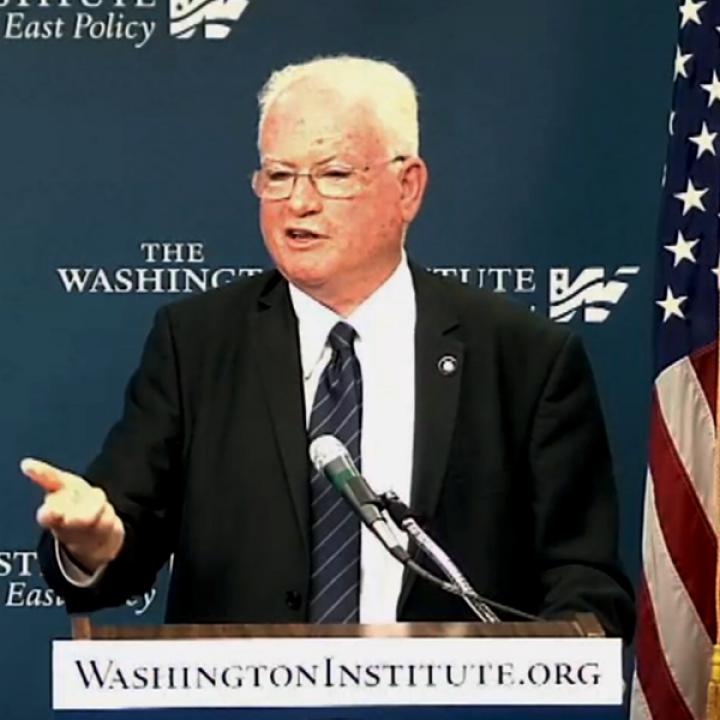
- Policy Analysis
- PolicyWatch 2155
Israeli Security Policy in an Uncertain Middle East 2013 Zeev Schiff Memorial Lecture

Part of a series: Zeev Schiff Memorial Lectures
or see Part 1: The Unlikely Peace: Prospects for an Israeli-Palestinian Agreement in 2008
Watch the 2013 Zeev Schiff Memorial Lecture on Middle East Security with Amos Gilad, director of the Political-Military Affairs Bureau at Israel's Ministry of Defense.
On October 9, Amos Gilad, the director of the Political-Military Affairs Bureau at Israel’s Defense Ministry, delivered The Washington Institute's 2013 Zeev Schiff Memorial Lecture, held annually in honor of the esteemed defense correspondent, strategic thinker, and longtime friend of the Institute. The following is a rapporteur's summary of the general's remarks.
Israel's main security concern is Iran, its only potential existential threat at the moment. Yet despite that threat and the continuing turmoil in the Middle East, Israel is more secure than ever.
THE IRAN THREAT
When Binyamin Netanyahu was first elected prime minister in 1996, he was presented with an intelligence assessment that Iran would become Israel's main enemy because of its vision of developing both a nuclear weapon and a large missile force. At the time, most other countries rejected this assessment, including the United States. Since then, much has changed. All leading intelligence services now agree that Supreme Leader Ali Khamenei has long been determined to put his country in a position where it could develop nuclear weapons at will. Iran is now at that point -- if Khamenei asked Ali Akbar Salehi, the head of Iran's Atomic Energy Organization, "Can we develop a nuclear weapon whenever we want?," the answer would be "yes."
Yet the past decade has provided another crucial lesson: namely, whenever the Iranian regime has faced an existential threat, it has delayed its nuclear project. In 2003, Iran's leaders believed that the United States would extend its war in Iraq to tackle the Islamic Republic as well, so they froze their nuclear activities. But they resumed the program after that pause and have since produced hundreds of missiles.
Today, sanctions have proven more effective than some would have imagined, and another round of sanctions is in the wings, representing a potential existential threat to the regime. In response, Tehran has once again made a strategic decision to delay the nuclear project, hoping to stop the momentum of the sanctions while preserving the ability to develop a nuclear weapon "in due time."
Indeed, new president Hassan Rouhani was selected because he offers the best chance of alleviating the impact of the sanctions. Although he has boasted that he is the best face of a "new Iran," he does not seek to change the regime's strategic interests. His predecessor, Mahmoud Ahmadinejad, presented a simpler problem in some ways -- his blunt approach reminded people of Hitler, while Rouhani is more sophisticated, using subtler tactics to gain time.
To be sure, Israel supports any initiative to remove Iran's nuclear capabilities, including the current U.S. diplomatic initiative. Yet it is doubtful whether any diplomatic efforts can accomplish that goal. Khamenei has not suddenly changed. His strategic mindset is very clear -- he hopes to gain relief from sanctions while making progress on the nuclear program. The consensus remains that Tehran has a strategic intention to develop nuclear weapons, and that it has the missiles needed to deliver such weapons.
The upcoming talks will take place in a different context than past negotiations. Unlike a decade ago, the U.S. goes into this round with deep awareness of the intelligence picture and wide consensus that the issues at stake represent a strategic threat to U.S. interests. If the diplomatic initiative fails, preventing a nuclear Iran remains imperative. All of the options -- diplomatic or military -- can only be judged by their results: whether or not Iran stops its military nuclear project. The goal is to prevent Iran from becoming a nuclear state; how to achieve that goal is a tactical issue.
For Israel, an Iranian nuclear weapon is an intolerable threat. It is intolerable to the United States as well, as President Obama has repeatedly declared. He is very serious when he says "all options are on the table, including the military option." The United States is fully committed to preventing Iran from developing nuclear weapons -- not for Israel's sake, but because it is a threat to U.S. national security.
As for the consequences of such a scenario, the moment Iran goes nuclear, Saudi Arabia and Egypt would do so as well. An Iranian nuclear capability would also undermine Israel's deterrence capabilities by creating an umbrella for terrorism. Today, Israel is able to deter Hezbollah from using the estimated 100,000 rockets in its arsenal; the same goes for the many rockets in "Hamastan." Yet the moment Iran unveils a nuclear weapon, these groups would become less hesitant to attack.
THE MUSLIM BROTHERHOOD AND EGYPT
The Muslim Brothers are one of the worst threats in the Middle East. They aspire to take over the region and have declared this intention publicly. Egypt, with its population of 90 million, is still the leader of the Middle East, so Brotherhood control there posed a region-wide threat. The group has also threatened Jordan's stability. Since the Brotherhood's failure in Cairo, however, the whole region is relieved, security along Israel's borders has improved, and Hamas has been isolated.
All signs indicate that there will be no democracy in the Middle East outside of Israel anytime soon, so the more appropriate policy objective is to pursue stability based on American influence. Democracy is not feasible in the region at the moment because Arab countries do not seem ready for fair elections.
For example, a free election in Gaza under Hamas rule is beyond imagination. Like the Muslim Brothers in many countries, Hamas is perfectly willing to allow one election -- the one that puts them in power. Thus, there can be no true democracy when the Brotherhood is in power. The new leadership in Egypt is not the best example of democracy either, but it is better than the alternative. Although some in the United States do not like to hear it, the brand of so-called "democracy" that brings terrible forces like the Brotherhood to power should not be recommended.
Of course, Israel would prefer to be surrounded by democracies and looks forward to that day. But realistically speaking, one should not expect real democracy in the region for decades to come.
In the wake of the Brotherhood's collapse in Egypt, a new, positive phenomenon has become more evident in the Middle East: the emergence of a Sunni axis. The powerful and strategic relationships that comprise this Sunni alliance are a great contribution to regional stability. They also represent a kind of "Pax Americana," since the countries in question generally prefer the United States. The Sunni axis is in Israel's interests as well, allowing it to enjoy a kind of peace with certain states -- not like the peace between the United States and Canada, but a peace nonetheless.
Meanwhile, the peace between Israel and Egypt is powerful and solid, and without it, there can be no peace with the Palestinians, Jordan, and other countries. Yet one of the main anchors of this peace is the United States. Therefore, any U.S. decision about whether to discontinue aid to Cairo should take all aspects of Israeli-Egyptian peace into consideration. Israel continues to be very frank in sharing its views on this matter with Washington.
THE WAR IN SYRIA
Although Syria still exists on the map, the state has effectively collapsed. There is no economic, political, or social future there. Unlike his father, Bashar al-Assad is shrinking his control over the country by pursuing a sectarian agenda. As a result, the overwhelming majority of the people have become his enemy.
Israel's position on the ongoing civil war reflects insights from Zeev Schiff's book on the 1982 Lebanon war. In traveling around the Arab world, one might get the impression that Israel is some sort of superpower of 400 million people. In fact, Israel is a small power. It cannot change regimes in other countries according to its wishes. Schiff argued that Israel has to fight such hubris. Moreover, if Israeli troops entered Syria even for one day, they would have the unintended effect of saving Assad. Instead, Israel has simply continued to warn Syria: "do not attack us, we will respond if we are intentionally attacked."
Meanwhile, Assad has agreed to give up the regime's huge quantities of chemical weapons -- an arsenal of something like 1,200 tons. Although the plan to remove this arsenal seems achievable, it is imperative to verify the regime's compliance each and every step of the way, and to never trust words alone. Damascus seems to have agreed to the plan based on fear of the existential threat posed by the U.S. military. In short, the United States signaled to Assad that he had two options: give up his chemical weapons and survive, or keep them and perish. He chose to survive.
This provides a very important lesson regarding Iran. Again, Tehran has decided to delay its nuclear program only when presented with an existential threat, in 2003 and today.
THE PALESTINIANS
After years of bombings and other attacks in its streets, Israel has defeated Palestinian terrorism. It has done so largely through the use of new intelligence technology; Israel does not need to rely on tanks and heavy armament to prevent terrorist attacks. For example, during the last confrontation in Gaza, Hamas sought to launch rockets at Tel Aviv. Yet the plan failed because Israel knew about it ahead of time, used distinct intelligence capabilities to locate the rockets (which were hiding behind civilian infrastructure), and prevented the attack.
As for peace talks, even if Israel signed an agreement with the Palestinian Authority, Hamas could still decide to attack five minutes later. Thus, Israel's main lesson from the last round of talks is to take care of security. Without security, peace would not survive for five minutes. Any peace agreement will have many security dimensions, and the Ministry of Defense is seriously committed to seeking a deal.
CONCLUSION
From a security point of view, now is the best time Israel has seen, despite the many challenges it faces. It has defeated Palestinian terrorism, and it has not faced a regular army since 1973 because its adversaries are convinced that defeating it in that manner is impossible. Yet some of Israel's enemies have found an alternative: building huge quantities of rockets in order to target civilians throughout the country. This is a great challenge. And although international cooperation with the United States and others have kept nuclear weapons out of Iran's hands for now, the regime remains determined to acquire them.
Amid these concerns, the current level of cooperation and understanding between Israel and the United States is unprecedented and remains valuable to both countries. The unique strategic relationship with Washington is a major pillar in Israel's national security. From Israel's point of view, there is no alternative to this relationship in terms of its quality and depth. In return, Israel has contributed to the security of the United States in many ways, including some that cannot be elaborated on publicly.
This rapporteur's summary was prepared by Harry Reis.
About the Schiff Memorial Lecture Series

Each year, the Schiff Memorial Lecture Series brings to Washington a distinguished leader from Israel's national security establishment. The series was established by a group of Washington Institute trustees to honor the memory of Zeev Schiff, dean of Israeli security experts, former Haaretz defense editor, and longtime associate of the Institute. Previous lecturers have included Ehud Barak, Moshe Yaalon, Amnon Lipkin-Shahak, Amos Yadlin, and most recently, Maj. Gen. (ret.) Yoav Galant, IDF.





